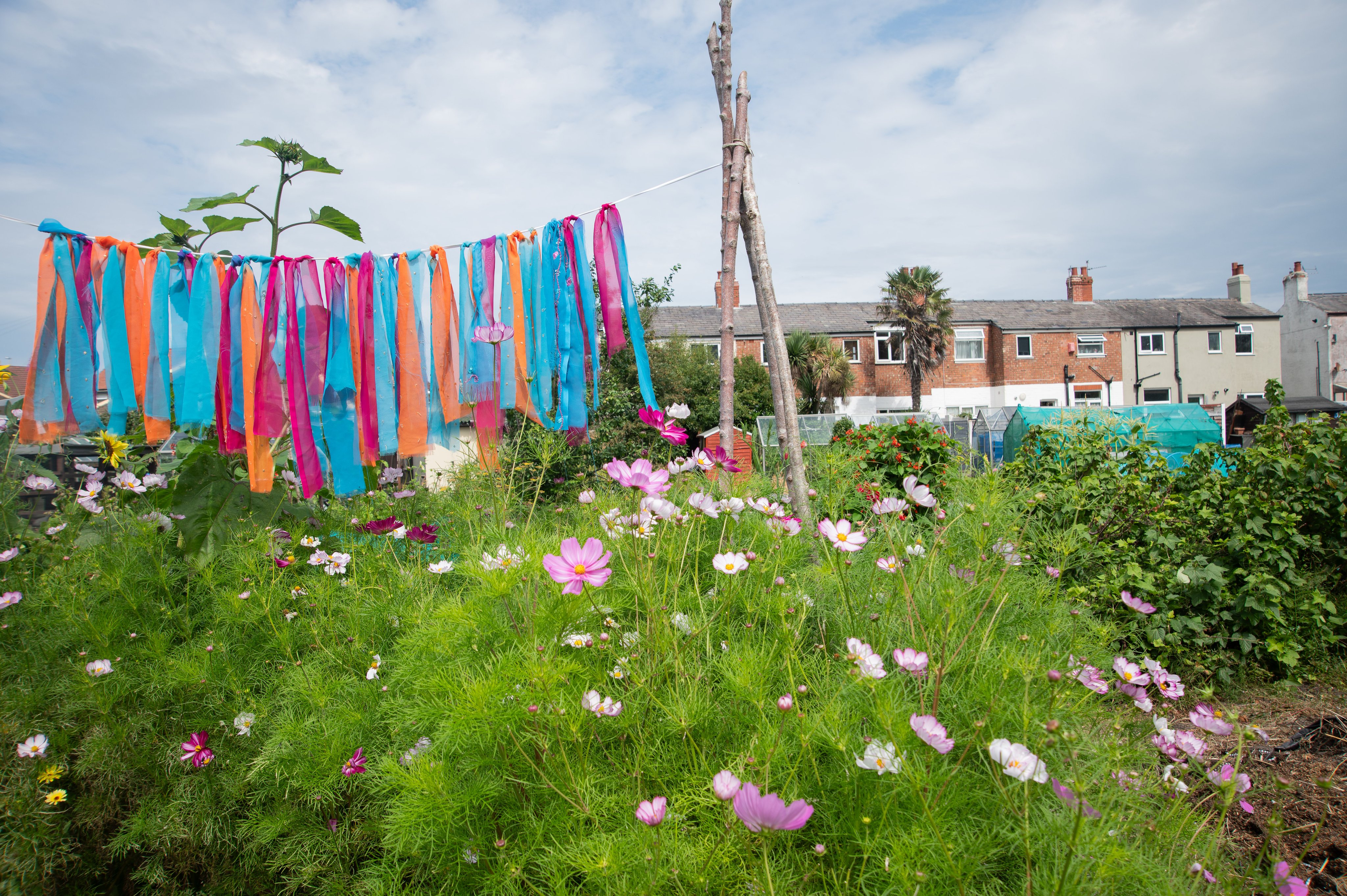Our first steps towards resourcing a network of future builders
A few weeks ago Sophia published a blog sharing the overall plans for the Emerging Futures work in 2023. This blog digs more deeply into one strand of work - the Pathfinders. This is an inspiring ecosystem of practitioners across the UK who are actively building alternative futures in their neighbourhoods and communities.
At the end of last year, we wrote to twenty-two organisations who we think are doing the deep, hard work of transformative change, asking them if JRF could support their work, through investment, power-building and platforming. These are people who are working day in, day out, to reimagine and redesign the world they want to live in, and the world they hope to leave behind.
100 years ago, our founder Joseph Rowntree was one of a generation of men and women who dedicated their lives to actively re-shaping the world around them. Then as now, the old world was making less and less sense; but a new world had yet to emerge. Through our Pathfinders work, we want to back the social and cultural pioneers of our times who, like Joseph Rowntree, are seeding and building the alternative futures we need.
In this work, we want to hold ourselves to account through two lenses: equity and transformative potential. Both are central to our Emerging Futures work. We want to support this work to show what’s possible, and to demonstrate that there are plausible alternatives that are centred on the flourishing of people and planet.
We have committed to working ‘in the open’ through all our emerging futures work, and so we have written this blog to share in more depth what we think is important about the work of these 23 organisations, and also to say more about our approach to supporting their work.
What is distinctive about the Pathfinders?
One of the first questions most people ask us about the Emerging Futures programme is what issues we will use to organise our work. The truth is, we are not that interested in an issues-based approach in our Pathfinders track. Instead we have developed a set of characteristics that we think are common across future-building work, and it is these characteristics that we have used to ground our decisions about which organisations to approach.
As well as being informed by the experiences we’ve had of resourcing futures work and the design of funding programmes elsewhere, in particular Cassie's work to develop and launch the Growing Great Ideas programme at TNLCF, these characteristics have been shaped and developed over the last 12 months in dialogue with a huge range of people operating across a range of approaches to change such as movement building, cultural and creative work, place-based systems change, healing and restorative work. We’ve also spoken with people experiencing injustice, poverty and disadvantage, as well as those in privileged positions of power in the worlds of philanthropy, policy-making and research.
We see these characteristics as work-in-progress: they are our best effort at defining the work at this moment in time, and they have guided our initial steps towards resourcing Pathfinders work. We know that as this first chapter unfolds, we will be able to bring deeper insight and greater definition to what we share here. An open inquiry into these characteristics will be a central part of our learning work in 2023.
Bringing a propositional approach
The pathfinders are practitioners: they are not just coming up with ideas of what we need, but are building these propositions in the real world. There is a tangibility to their work: something that people can see. If they are not place-based they are building operable frameworks, for example new legal contracts, new models of governance and so on.
Starting from a different place
While they are not necessarily explicit about it, through their work the Pathfinders are showing what it means to move away from an extractive economy that sustains poverty. The path they are charting to a more equitable and just future has a different starting point, rooted in concepts of solidarity, liberation, and interdependence. These are organisations that centre care and compassion in the work, as well as addressing the climate crisis, in the way they think about change in socio-economic and environmental systems.
Addressing change in multiple, interlocking systems simultaneously
The Pathfinders work is happening on multiple levels: while their day-to-day work may be happening in a neighbourhood, it can still be located as a story of change in something more systemic, about a commitment to reshaping economic paradigms. To enact this work, they are exploring alternative models of investment and drawing on different types of capital, they are practising a more democratic approach to the ownership of assets, wealth and ideas in their work, and they are re-shaping governance.
Revealing what else needs redesigning as they build
Through their work, the pathfinders are learning through doing about the nature of transitions work, and the barriers that present themselves along the way. These are organisations who uncover what else needs re-imagining and redesigning as they go - for example, regulations, governance, legal frameworks.
Ecosystem mindset
Pathfinders are generous as well as generative. They set out to work in a way that is open and generative on behalf of the wider ecosystem – sharing learning, dilemmas, and giving away their models and assets for others to adopt and adapt. They are led by a next generation of ‘social entrepreneurs’ whose practices are firmly rooted in a collective approach to leadership that goes well beyond organisational boundaries.
Plural practices
Pathfinders are skilled at weaving together lived, learned and practice experience to inform their work. They give value to many different forms of knowledge and theories of change. These organisations have transdisciplinary teams with expertise in a range of approaches through which to influence change.
One other characteristic in this first wave…
We noticed that there are a handful of organisations who are being asked to speak about their work to inspire others, alongside their hard graft on the ground building things and teams. This role of being ‘beacons of hope’ to others is a huge amount of additional labour, and we wanted to recognise the importance of their storytelling and sense-making efforts, as an essential part of inspiring action elsewhere.
Resourcing an ecology, not individual projects
In identifying these more ‘established’ Pathfinder organisations, we wanted to be explicit that JRF’s role is not to make a series of bilateral grants. Instead we wanted to bring resources to an ecosystem of people and initiatives, where the whole has potential to be greater than the sum of its parts. We want to act in a way that respects and supports the relationships and interdependencies of their work.
Support to stay systemic
It’s for this reason that we talk about resourcing an ‘ecology’ of work. We want to learn - through doing - what this approach means. Early conversations with the pathfinders have started to bring some shape to this ecology approach. As well as unrestricted core funding, we will be providing support through:
- Working to expand the potential funding available for this kind of work
- Helping organisations to identify and access other kinds of finance and investment
- Supporting access to, and payment for, specialist support (e.g. HR, legal, evaluation)
- Offering advice, guidance and resources for story telling, documenting and influencing work
- ‘Holding space’ for - and resourcing - collaborative opportunities/support across these organisations
- Offering access to capacity building activities e.g team coaching, skills building and leadership coaching
- ‘Holding space’ and finding funding for development of ideas as they come up against ‘hidden wiring’ that needs redesigning
Deepening and expanding the work
We’ve also made a distinction within the Pathfinders group between those that are maybe further along in their journey, or are operating in deeper or wider complexity (with larger teams, or a capital project for example) - and those whose work is still developing. This is not to create a hierarchy, but rather to acknowledge that there are teams that have been developing these sets of practices over longer time periods or in live contexts.
For those earlier in their journeys we also think it’s vital for them to be in relationship with those further ahead. We know that there are already informal ‘elder’ relationships in the ecosystem. We also know that those further ahead on their journey need to see that there are others coming up alongside them, so as to take the pressure off their shoulders that our futures are all dependent on them.
What’s next
We wanted to share this update to signal where we are heading with the Pathfinders work. This is just one track of the Emerging Futures programme - you can find out more about all the others in our previous blog.
We remain committed to learning through funding. That means we are determined to move money even while we don’t have all the answers. Over the course of 2023, these are some of the questions we will be asking as we stand alongside the Pathfinders:
What resources are needed to support this work in the long-term? We have moved £900,000 in total to 23 organisations, in either £50,000 or £30,000 chunks. We want to find ways of drawing significantly more investment into this work of building alternative futures. What will that take?
How do we expand the initial list of Pathfinders and resource more work? The Emerging Futures programme has a 10 year timeframe: this is our very first step and our ambition over time is to resource much more work, at a larger scale, in ways that are aligned with our dual commitments to equity and transformative potential. Over the course of 2023 we want to explore how we refine the characteristics we’ve shared here. We will need to do more design work on how we bring rigour to decisions about future waves of resources for more Pathfinders.
What other work needs resourcing to sustain the efforts of the Pathfinders? Early conversations suggest we will need to invest money in efforts to reshape the ‘hidden wiring’ - forms of governance, contracts, and regulations that currently get in the way of this future building work. We want to give careful thought to how we resource this kind of work.
Meet the Pathfinders
Thanks for reading this far! We now invite you to delve in and explore the incredible work of the organisations we want to get alongside through our Pathfinders work in 2023. We think these organisations together represent our lifeboats to the future. We hope you are as inspired by their work as we are, and that reading about them invites you to stretch your own ambition about how you could support the transition to a world where people and planet can both flourish.

This explainer is part of the imagination infrastructures topic.
Find out more about our work in this area.
